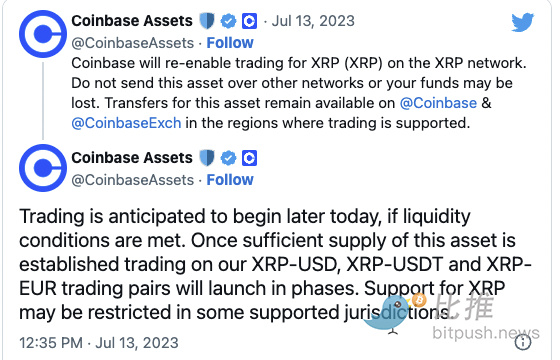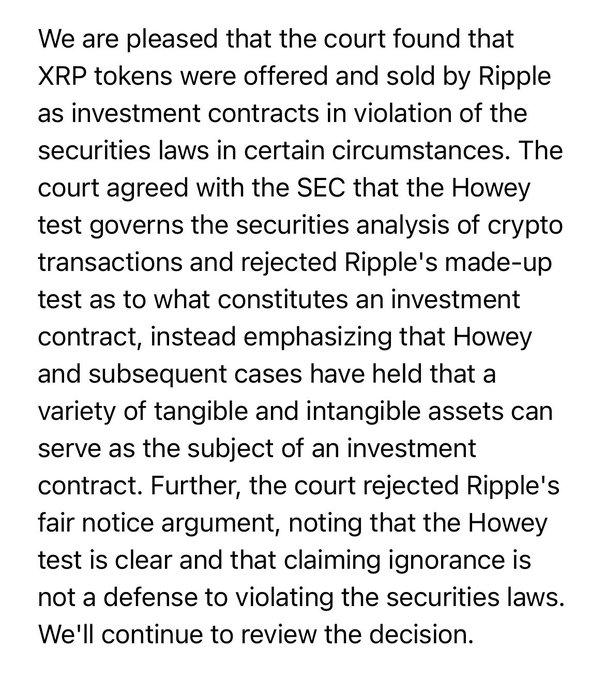Ripple wins brief legal victory, XRP token not a security?
Ripple wins legal victory, XRP not a security?Original text: “Ripple wins milestone victory, XRP security status undecided, SEC may continue to appeal.”
Author: BlockingBitpushNews Mary Liu
On July 13th local time, US federal judge Analisa Torres ruled that Ripple Labs Inc. did not violate federal securities laws by publicly trading and selling XRP tokens through algorithms. This is the first time a US judge has made a decision in favor of Ripple, which could set a precedent for future token classification cases and has been celebrated by the crypto community.
XRP tokens also soared in response, with Blocking terminal data showing XRP rising nearly 80% to $0.81, a new high for over a year. A variety of tokens, including Solana (SOL), Polygon (MATIC), and Cardano (ADA), which were previously considered securities by the SEC, rose 15% after the news broke.
- Ripple wins ruling that XRP is not a security
- Written on Binance’s 6th anniversary: Will there be a warm spring after the crypto winter?
- What makes Sound.xyz, the leading player in the music NFT field, attractive to a16z’s investment?

Coinbase had previously delisted XRP from its trading platform, but announced on Thursday afternoon that it will once again allow trading of the asset. Another US exchange, Gemini, said it is “exploring listing XRP for spot and derivatives trading.”
Ripple founder Garlinghouse celebrated the result in a post on Twitter, writing: “Thanks to everyone who helped us get to this decision – this decision is for all crypto innovation in the US, and there will be more to come.”
The complex ruling: Is XRP a security or not?
As previously reported by Blocking, on December 22, 2020, the SEC officially announced a lawsuit against Ripple and its founders Brad Garlinghouse and Christian A. Larsen. The filing claimed that since 2013, Ripple and its founders had sold over 14.6 billion units of the digital asset security “XRP” in exchange for over $1.38 billion, and that the defendants did not register their offers and sales of XRP or obtain any registration exemptions, violating federal securities law registration requirements.
The new ruling does not represent a complete victory for Ripple, as the judge also made a ruling in favor of the US Securities and Exchange Commission (SEC).
Analisa Torres ruled that Ripple’s direct sale of $728.9 million in XRP to institutional investors constitutes unregistered securities sales, in violation of federal securities laws. The ruling stated: “After considering the economic reality and the totality of the circumstances surrounding the institutional sales, the Court concludes that Ripple’s XRP institutional sales constituted offers and sales of unregistered investment contracts, in violation of Section 5 of the Securities Act.”
Stephen Bloockingley, a partner at the law firm Brown Rudnick, analyzed in his article that the view that XRP is not a security is clearly wrong.
The lawyer believes that this ruling can be divided into three parts, analyzing the facts surrounding the sale of XRP: institutional sales, sales through algorithms, and “other distributions” such as employee compensation.
When it comes to “Ripple selling XRP to complex individuals and entities,” the court sided with the SEC, stating that these are securities transactions and constitute investments. However, when it comes to sales made programmatically or through trading algorithms and other distribution methods, Ripple wins.
Bloockingley emphasizes another important issue: whether cryptocurrency exchanges like Coinbase need to register themselves as securities exchanges. The SEC has made it clear that most trades of crypto assets should be treated as securities. However, Bloockingley says the court did not come to a conclusion on this matter, which is another (implicit) victory for Ripple.
Chris Martin, the head of research at Amberdata, said in an interview with CNBC, “Today’s ruling is a big step forward for the industry. By ruling that the sale of XRP by exchanges is not a security, we are beginning to understand what constitutes a security and what constitutes a commodity – the SEC will have to modify their strategy in several ongoing cases, and I expect this ruling to apply to several other tokens as non-securities.”
Martin added, “Ripple’s institutional sales of XRP also have a huge impact on the industry, and some ICOs may now become the focus of attention. It is unclear how this ruling will affect exchanges involved in SEC litigation, most of which are involved in secondary sales. But as we have seen from today’s price action, the market is very optimistic about this ruling.”
SEC Response
The SEC has responded to the court’s ruling. The SEC told Fox News that it is satisfied with some of the ruling, but is still weighing the court’s final decision.
The SEC responded: “The court found that Ripple offered and sold XRP tokens in some instances as investment contracts in violation of the securities laws. We are pleased with this part of the ruling, as the court agreed with the U.S. Securities and Exchange Commission (SEC) that the Howey test can be used to analyze whether cryptocurrency transactions are securities and rejected Ripple’s self-test of what constitutes an investment contract, emphasizing that Howey and subsequent cases have established that various tangible and intangible assets can be the subject of investment contracts. In addition, the court rejected Ripple’s fair notice argument, stating that the Howey test is clear and that ignorance of the law is not a defense against violating securities laws. We will continue to weigh the court’s decision.”
Consensys lawyer Bill Hughes predicted in his tweet that the SEC is likely to appeal the case to the Second Circuit Court. “The SEC’s enforcement strategy has taken a serious blow, the SEC’s pseudo-legislation through overly broad rulemaking has been severely disrupted, and the SEC chairman’s reputation on Capitol Hill and in government will be at an all-time low,” he said.
Some cases are still pending, and the judge refused to rule on the SEC’s charges that Garlinghouse and Larsen aided and abetted Ripple’s illegal conduct, including selling products to institutional investors. This means that unless both parties reach a settlement or the SEC abandons the charge, the charge will continue to be left to the jury to decide, and a specific trial date has not been set.
Legislative Appeals
The Ripple case is far from over, and today’s ruling is the ruling of the first-instance court, some of which are likely to be appealed and overturned. But the ruling has sparked new calls for legislation to provide clear rules for tokens, requiring Congress to clarify the status of digital assets.
Katten Muchin Rosenman lawyer Gary DeWaal said the ruling could help Coinbase’s lawsuit, saying the market reaction shows that the result “is a major event for the industry” and also marks Congress’s need to pass legislation to establish standards for digital assets.
Tom Emmer, House Majority Whip and Republican, tweeted that the resolution indicates that “tokens and investment contracts are separate and distinct, and may or may not be investment contracts. It’s time to legislate.”
We will continue to update Blocking; if you have any questions or suggestions, please contact us!
Was this article helpful?
93 out of 132 found this helpful
Related articles
- The Crossroads of GameFi: Continue with P2E or Seek Breakthroughs
- The true meaning and future expectations of an inverted yield curve
- Exploring Cross-Chain Communication from the Perspective of Rollup
- What is the allure of Sound.xyz, the leader of the music NFT track, with a16z as the lead investor?
- A Quick Guide to Understanding the EU’s New Concept of Web4
- In-depth analysis of MakerDAO’s RWA layout: How does the DeFi protocol integrate real-world assets?
- After launching an upgraded application, OKX Hong Kong has recorded over 10,000 new user registrations within a month.







